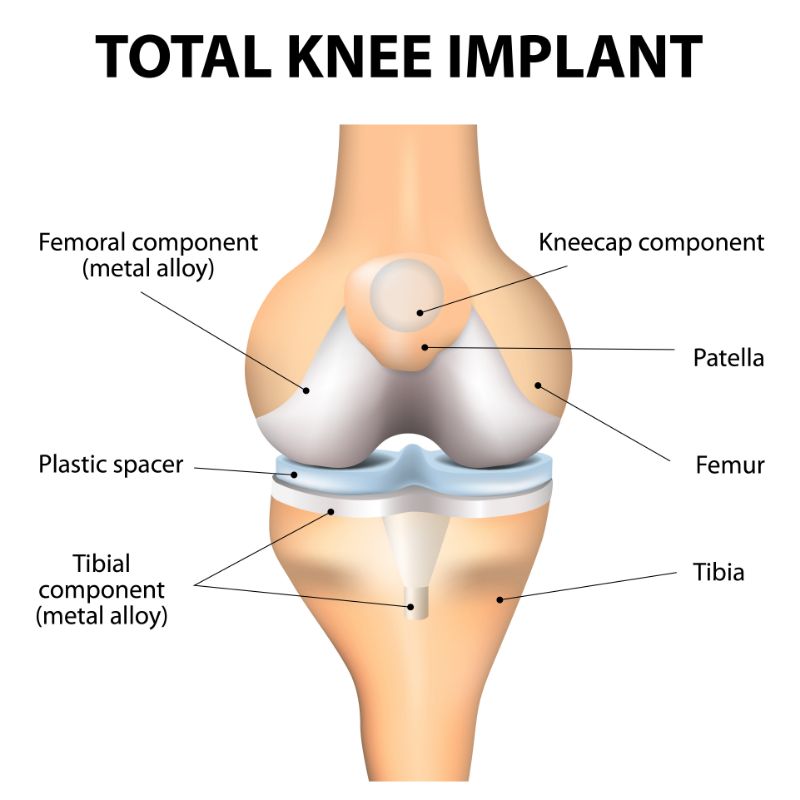If you have had a knee replacement and have experienced problems, you may be a candidate for revision knee replacement. Initial knee replacement surgery can provide significant pain relief from arthritis and allow a patient to remain active for many years after the procedure. Fortunately, many of these patients are able to live the rest of their lives without the need for additional knee surgery. For other patients, a second procedure may be required to correct problems caused by the initial procedure or to replace an implant that has worn over time. This is known as a revision knee replacement.
Since revision knee replacement is more complex than initial knee replacement surgery, it is important to choose a surgeon who has expertise in revision procedures to ensure the best possible outcome.
At OrthoMed Center, our board-certified orthopedic surgeons are highly qualified to handle these complex cases for our patients. Their expertise, combined with our compassionate staff, ensures you have the best experience possible with revision knee replacement surgery.
While
knee replacement surgery is a very successful procedure for most patients, for others, knee implants fail either due to infection or wear on the implant over time. Implant failure can cause pain, swelling, or stiffness in the knee. As a result, these patients need a revision knee replacement to correct these problems.
Other reasons a knee implant may fail include:
- Loosening of the implant over time
- Instability due to ligament injuries
- Stiffness due to excessive scar tissue around the joint
- A fracture in the area surrounding the knee implants
Patients who had their original knee replacement at a younger-than-average age have a higher chance of needing revision knee replacement surgery in the future due to wear on the implant. These patients will often “outlive” their implant, as the components can wear and loosen from the bone over time.
Revision knee replacement surgery is a more complex procedure than an initial knee replacement. The procedure takes longer to complete due to the care the surgeon must take to preserve as much healthy bone and tissue as possible. Because these cases are more complex, extensive planning, specialized implants, and tools are required to achieve a good result.
Although the incision is made in the exact location as the original knee replacement incision, it may need to be larger to remove the old implants. The original implant or implants need to be removed carefully to preserve as much healthy bone as possible.
In some instances, only one implant or component of the prosthesis has to be revised. At other times, all three components–femoral, tibial, and patellar–need to be removed or replaced. Once the old implant or implants have been removed, your orthopedic surgeon will prepare the bone for the new implant(s). Revision knee implants are often larger than the original implants to make up for structural changes in the knee, like bone loss. If there is significant bone loss around the knee, your orthopedic surgeon may use metal augments to take the place of lost bone so that the knee is better aligned and more stable.
If revision knee replacement surgery is needed due to an infection, the original metal implants may be left in place if the bacteria can be washed out. In these cases, only the plastic spacer between the metal implants needs to be replaced. However, in more severe cases of infection, revision surgery is done in a staged approach. First, the original implants are entirely removed and replaced with a cement spacer, and the patient is treated with antibiotics until the infection clears. Then, the surgeon performs a second procedure to insert new knee implants.
When you undergo revision knee replacement surgery, the recovery process is similar to what you experienced with the original knee replacement surgery, but it is typically longer.
Most patients will need to stay in the hospital for a few days after revision knee replacement surgery. Upon returning home, you will likely need assistance for several days or weeks until you can get around independently.
Medications will be given to help with pain, and patients are referred to see a physical therapist after surgery. Physical therapy is an integral part of recovery to help patients restore strength and range of motion in the knee.
Most patients can resume all normal activities within 6-8 weeks of surgery, but this can vary for each patient.
If you have had a knee replacement and have experienced problems, you may be a candidate for revision knee replacement surgery. To schedule an appointment with one of our orthopedic surgeons, please call OrthoMed Center at (209) 524-4438 to schedule an appointment. You also may request an appointment online.




